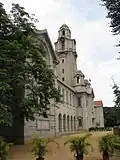Utpal S. Tatu
Utpal Shashikant Tatu is an Indian molecular biologist, biochemist and a professor and Chairman of the department of biochemistry of the Indian Institute of Science. He is known for his research on infectious disease such as malaria and other neglected tropical diseases of global relevance. He is one of the first proponents of "One Health" concept to control infectious disease outbreaks. Tatu is an elected fellow of the Indian Academy of Sciences. The Department of Biotechnology of the Government of India awarded him the National Bioscience Award for Career Development, one of the highest Indian science awards, for his contributions to biosciences in 2008. Tatu is a proponent of the One Health approach. The 'One Health' approach advocates designing and implementing strategies, policies and carrying out scientific research which involves collaboration between multiple sectors that will lead to major public health outcomes.[1]
Utpal S. Tatu | |
|---|---|
| Born | 12 May 1964 Caranzalem, Goa, India |
| Nationality | Indian |
| Alma mater | |
| Known for | Studies on malaria and other neglected infectious diseases of global relevance. |
| Awards |
|
| Scientific career | |
| Fields | |
| Institutions | |
Biography

Utpal Tatu, born on 12 May 1964, he secured a PhD from the Indian Institute of Science (IISc).[2] Later, completed his post doctorate research at Yale University in New Haven, Connecticut. Subsequently, he joined the IISc as a faculty at the Division of Biological Sciences and holds the position of a professor.[3] He heads Prof. Utpal Tatu's Lab[4] where he hosts many post-doctoral and doctoral researchers as well as scientists.[5] He is known for his research on malaria and the biology of molecular chaperones and his team is involved in finding new drug delivery protocols to fight the disease. Tatu's studies have been documented by way of a number of articles[note 1] and the online article repository of the Indian Academy of Sciences has listed 20 of them.[6] He also serves as an editor of the Newsletter of the Proteomics Society, India.[7]
Tatu is a global health expert focusing on improving the methods of diagnosis and treatment of neglected infectious diseases.
The Department of Biotechnology of the Government of India awarded Tatu the National Bioscience Award for Career Development, one of the highest Indian science awards in 2008.[8] The Indian Academy of Sciences elected him as a fellow in 2012.[9]
Selected scientific publications
- Roy, Nainita; Nageshan, Rishi Kumar; Ranade, Shatakshi; Tatu, Utpal (2012). "Heat shock protein 90 from neglected protozoan parasites". Biochimica et Biophysica Acta (BBA) - Molecular Cell Research. 1823 (3): 707–711. doi:10.1016/j.bbamcr.2011.12.003. PMID 22198098.
- Pallavi, Rani; Acharya, Pragyan; Chandran, Syama; Daily, Johanna P.; Tatu, Utpal (19 August 2010). "Chaperone expression profiles correlate with distinct physiological states of Plasmodium falciparum in malaria patients". Malaria Journal. 9: 236. doi:10.1186/1475-2875-9-236. ISSN 1475-2875. PMC 2933700. PMID 20719001.
- Selvaraj, Sundar Rajan; Bhatia, Vaibhav; Tatu, Utpal (1 December 2008). "Oxidative Folding and Assembly with Transthyretin Are Sequential Events in the Biogenesis of Retinol Binding Protein in the Endoplasmic Reticulum". Molecular Biology of the Cell. 19 (12): 5579–5592. doi:10.1091/mbc.e08-01-0026. ISSN 1059-1524. PMC 2592650. PMID 18815280.
See also
Notes
- Please see Selected bibliography section
References
- "One Health". World health organization. Retrieved 15 April 2019.
- "Malaria: An Unconquered Frontier" (PDF). Ensemble. May 2014. Retrieved 6 January 2018.
- "Utpal S. Tatu - Division of Biological Sciences, Indian Institute of Science". bio.iisc.ac.in. 6 January 2018. Archived from the original on 7 January 2018. Retrieved 6 January 2018.
- "Prof. Utpal Tatu's Lab". utlab3.biochem.iisc.ernet.in. 6 January 2018. Retrieved 6 January 2018.
- "Current members". utlab3.biochem.iisc.ernet.in. 6 January 2018. Retrieved 6 January 2018.
- "Browse by Fellow". Indian Academy of Sciences. 6 January 2018. Retrieved 6 January 2018.
- "PSI News Letter" (PDF). Proteomics Society, India. December 2014. Retrieved 6 January 2018.
- "Awardees of National Bioscience Awards for Career Development" (PDF). Department of Biotechnology. 2016. Archived from the original (PDF) on 4 March 2018. Retrieved 20 November 2017.
- "Fellowship - Indian Academy of Sciences". www.ias.ac.in. 6 January 2018. Retrieved 6 January 2018.
External links
- "Utpal S Tatu - Professor - IISc Bangalore" (YouTube video). Next Genius. 19 December 2016. Retrieved 6 January 2018.